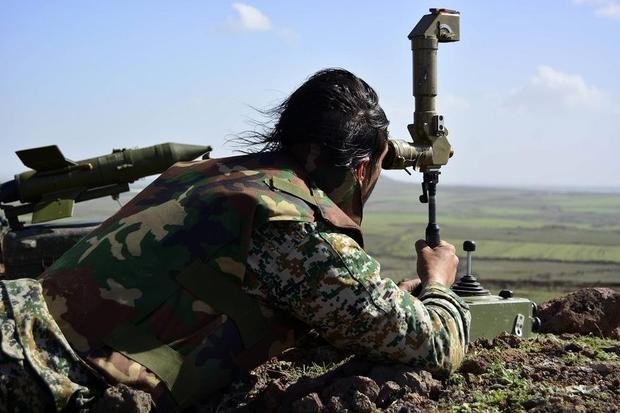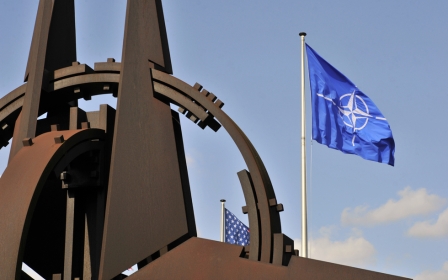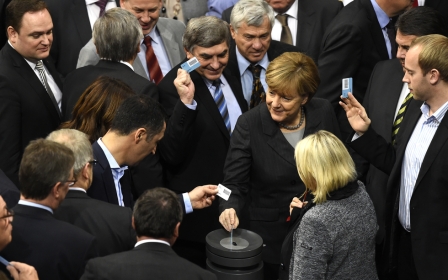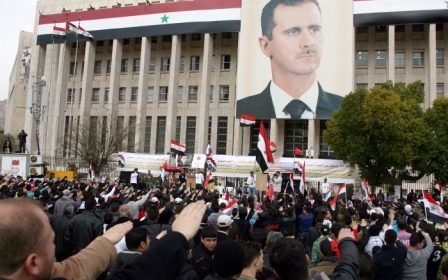FSA: Syrian rebel groups must unite to defeat Assad

The Syrian opposition is gathering in Saudi Arabia on Tuesday to agree a unified political position based on removing President Bashar al-Assad from power, a senior member of the Free Syrian Army has told Middle East Eye.
Major Issam al-Reis, spokesman for the FSA Southern Front, said the two day conference in Riyadh was a “positive step” that can unite Syria’s fractured military and political opposition.
“Everyone who is attending has a vision of uniting Syria,” he said, from his base in Turkey. “They will discuss the problems [between groups] and end by agreeing on a unified position. Our message is that Syrians are united and Syria has a future together.
“I think we will have a document and a statement that will serve as a platform for any future initiatives of talks. This meeting is not about financial or any other kind of support.
"This is about agreeing on one statement, one position, one vision for the opposition – this is much more important than anything else.”
The Southern Front is the largest single Syrian opposition group, with 25,000 fighters based in south Syria.
Among the other groups expected to attend the Riyadh conference are Islamist movements Jaish al-Islam and Ahrar al-Sham, who are supported by Saudi Arabia and Turkey respectively. These two groups together have an estimated 27,500 fighters battling Assad’s forces in central and northern Syria.
First meeting of its kind
The meeting in Riyadh is the first time in five years of war that there has been an attempt to bring together all the various factions that make up Syria’s opposition. One hundred and fifty delegates will try to find common ground and agree on a public statement, but, perhaps more significantly, they will aim to form a 25-man committee to represent the opposition.
However, a Western diplomat told Reuters that the meeting was not “all-encompassing”.
“I do not expect Riyadh to be a constructive step […] the whole thing has been very acrimonious and it looks like a Saudi-Turkey wish list,” the unnamed diplomat said.
Reis said an important reason for the Riyadh conference was to build a stronger voice for the opposition, in light of recent international talks in Vienna where international powers discussed ways to bring an end to the civil war.
“There were no Syrians in Vienna,” he said. “Everything that was decided there didn’t include our opinion. That’s why we are going to Riyadh to have one position [for any future talks].”
The Vienna talks in November saw Saudi Arabia and Iran sit together to discuss a war in which they have backed opposite sides - a move that many analysts have said may prove key in ending a conflict that has killed more than 200,000 people in five years.
After Vienna international powers announced a plan to begin on 1 January that would see local ceasefires announced, which will be monitored by the UN, and a transitional government formed that will include both President Assad and the opposition.
The plan to include Assad in Syria’s future was a marked turn for many of the participants at Vienna, including many Western countries who have repeatedly called for the Syrian president to be toppled due to his responsibility for the vast majority of civilian casualties in the war.
This policy change has come largely as a result of an increased international focus on the Islamic State group, particularly after it claimed responsibility for the recent attack in Paris that killed 130 people.
French Foreign Minister Laurent Fabius has suggested Assad’s army could be an ally in the fight against IS, a position backed up this week by Conservative MP and London Mayor Boris Johnson.
Assad 'giving support to IS'
However, the FSA’s Reis said this change of heart is the result of a successful strategy by Assad to promote the threat of IS.
“There can be no doubt that Assad is giving support to IS,” he said. “He buys oil from them, he wants to make sure they can keep going.
“The only way he can convince the international community of his worth is to make them think he is fighting terrorism. He is using IS to strengthen his position – this is the only way Assad can stay in power.”
Reis said anyone who backs Assad is betraying the Syrian people because he is “using Iranians, Hezbollah, and Russia in a war against his own people”.
“He is using foreign powers to fight for him and keep him in power. The Syrians aren’t fighting with Assad.”
Defectors from the Syrian army recently told Middle East Eye that up to 70 percent of troops fighting in southern Syria are either Iranian or from the Lebanese movement Hezbollah.
Reis said the opposition will demand in Riyadh that Assad is removed at the beginning of the transition period, contradicting the plans announced after November’s Vienna talks.
Two groups who will not be in Riyadh are al-Qaeda affiliate the Nusra Front and the Kurdish YPG militia.
Reis said Nusra, who have a powerful presence in northern Syria, has not been invited to the conference because it does “not have legitimacy from the Syrians” and was full of foreign fighters.
He described the YPG as a "terrorist militia supporting Assad", in a reference to the Kurdish militia’s priority to carve out a state in northern Syria rather than join in the wider battle to overthrow the president.
While the YPG is viewed by many in the West as a key partner in fighting IS, Reis said the Kurdish militia was “not considered part of the opposition” and would not work with it despite overtures from the international community.
“The groups representing the opposition now [in Riyadh] are 10 times stronger than any other group on the ground. They are enough, they represent the majority,” he said.
New MEE newsletter: Jerusalem Dispatch
Sign up to get the latest insights and analysis on Israel-Palestine, alongside Turkey Unpacked and other MEE newsletters
Middle East Eye delivers independent and unrivalled coverage and analysis of the Middle East, North Africa and beyond. To learn more about republishing this content and the associated fees, please fill out this form. More about MEE can be found here.




